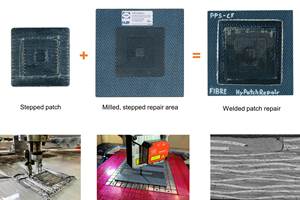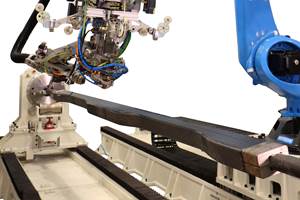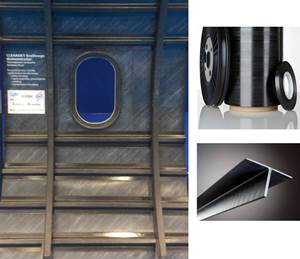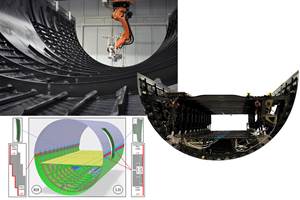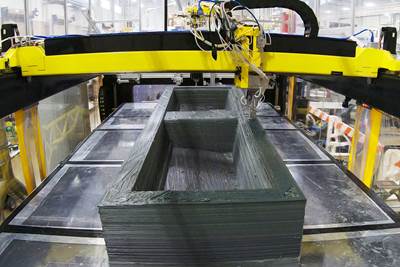Cyanate ester resins feature high-temperature processing capabilities
CAMX 2024: Arxada AG showcases its thermoset resins Primaset HTM-100 and Primaset HC for high temperatures, FST, dielectric properties and more.
Share
Arxada AG (Basel, Switzerland) presents its portfolio of Primaset cyanate ester resins, used in composites for commercial, defense and space applications, particularly for radomes. Primaset resins are thermoset resins which can provide high temperature resistance, intrinsic FST properties, optimal dielectric properties and versatility.
Under the name Primaset HTM-100, Arxada has developed a novel cyanate ester-based material combining the high-temperature performance of cyanate ester resins with optimal thermal oxidative stability. It has the potential for use in high-temperature applications, composite tooling and metal parts replacement.
Primaset HTM-100 provides a Tg up to 306°C (tan delta by DMA), average toughness (KIc = 0.51 MPa*m1/2) and less than 10% mass loss after a continuous 10,000 hours at 250°C on neat resin level. In moisture conditions (EN 2823, RH 80-85% and temperature of 70°C) the water uptake is 2.9% and Tg wet only slightly lower than in dry conditions.
When compared to standard DDM-BMI, which loses more than 25% mass after only 1,000 hours, Primaset HTM-100 is said to provide improved thermal oxidative stability (<1.6% under the same conditions), high temperature resistance and easy processability (epoxy-like).
Moreover, Arxada contends that Primaset HTM-100 is easier to process when compared to high-temperature thermoplastics and high-temperature BMI/polyimides resins. Its viscosity profile enables its use in several manufacturing processes. It can be provided as a neat resin (to meet the needs of RTM and other infusion technologies), hot-melt prepreg and other manufacturing processes. Arxada can provide customer technical support with catalyzed solutions to meet any required specific process conditions.
Arxada is also highlighting Primaset HC-resins, a thermoset system with ultra-low dielectric properties that can be processed with standard methods like infusion, RTM, filament winding, pultrusion and prepregging.
Related Content
-
Developing repairs for thermoplastic composite aerostructures
HyPatchRepair project proves feasibility of automated process chain for welded thermoplastic composite patch repairs.
-
MFFD thermoplastic floor beams — OOA consolidation for next-gen TPC aerostructures
GKN Fokker and Mikrosam develop AFP for the Multifunctional Fuselage Demonstrator’s floor beams and OOA consolidation of 6-meter spars for TPC rudders, elevators and tails.
-
PEEK vs. PEKK vs. PAEK and continuous compression molding
Suppliers of thermoplastics and carbon fiber chime in regarding PEEK vs. PEKK, and now PAEK, as well as in-situ consolidation — the supply chain for thermoplastic tape composites continues to evolve.
Related Content
Developing repairs for thermoplastic composite aerostructures
HyPatchRepair project proves feasibility of automated process chain for welded thermoplastic composite patch repairs.
Read MoreMFFD thermoplastic floor beams — OOA consolidation for next-gen TPC aerostructures
GKN Fokker and Mikrosam develop AFP for the Multifunctional Fuselage Demonstrator’s floor beams and OOA consolidation of 6-meter spars for TPC rudders, elevators and tails.
Read MorePEEK vs. PEKK vs. PAEK and continuous compression molding
Suppliers of thermoplastics and carbon fiber chime in regarding PEEK vs. PEKK, and now PAEK, as well as in-situ consolidation — the supply chain for thermoplastic tape composites continues to evolve.
Read MoreManufacturing the MFFD thermoplastic composite fuselage
Demonstrator’s upper, lower shells and assembly prove materials and new processes for lighter, cheaper and more sustainable high-rate future aircraft.
Read MoreRead Next
MVP releases new model of RAM system for thermoset materials
New large-format AM machine model, RAM 48, maximizes production efficiency and enables custom build dimensions when fabricating thermoset materials.
Read MoreAll-recycled, needle-punched nonwoven CFRP slashes carbon footprint of Formula 2 seat
Dallara and Tenowo collaborate to produce a race-ready Formula 2 seat using recycled carbon fiber, reducing CO2 emissions by 97.5% compared to virgin materials.
Read MoreDeveloping bonded composite repair for ships, offshore units
Bureau Veritas and industry partners issue guidelines and pave the way for certification via StrengthBond Offshore project.
Read More



